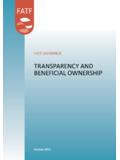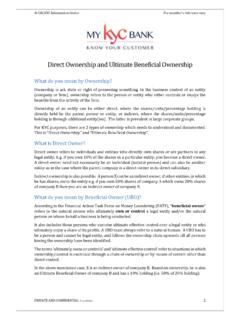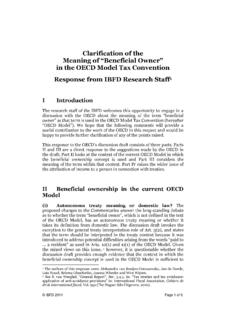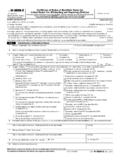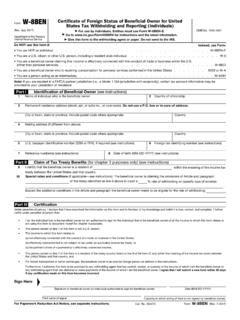Transcription of CLARIFICATION OF THE MEANING OF “BENEFICIAL OWNER” IN THE ...
1 ORGANISATION FOR ECONOMIC CO-OPERATION AND DEVELOPMENT CLARIFICATION OF THE MEANING OF beneficial owner IN THE OECD MODEL TAX CONVENTION DISCUSSION DRAFT 29 April 2011 to 15 July 2011 CENTRE FOR TAX POLICY AND ADMINISTRATION 2 29 April 2011 CLARIFICATION OF THE MEANING OF beneficial owner IN THE OECD MODEL TAX CONVENTION Public discussion draft The concept of beneficial owner found in Articles 10, 11 and 12 of the OECD Model Tax Convention has given rise to different interpretations by courts and tax administrations. Given the risks of double taxation and non-taxation arising from these different interpretations, the OECD Committee on Fiscal Affairs, through its Working Party 1 on Tax Conventions and Related Questions, has worked on proposals aimed at clarifying the interpretation that should be given to that concept in the context of the OECD Model Tax Convention. This discussion draft includes the proposed changes to the Commentary on Articles 10, 11 and 12 of the OECD Model Tax Convention that the Working Party has drafted for that purpose.
2 The Committee intends to ask the Working Party to review these proposed changes in light of the comments from all interested parties. It therefore invites comments on this discussion draft before 15 July 2011. These comments will be examined at the September 2011 meeting of the Working Party. Comments on this discussion draft should be sent electronically (in Word format) to: Jeffrey Owens Director, CTPA OECD 2, rue Andr Pascal 75775 Paris FRANCE e-mail: Unless otherwise requested at the time of submission, comments submitted to the OECD in response to this invitation will be posted on the OECD website. This document is a discussion draft released for the purpose of inviting comments from interested parties. It does not necessarily reflect the final views of the OECD and its member countries. 3 PROPOSED CHANGES TO THE COMMENTARY ON ARTICLES 10, 11 AND 12 [Additions to the existing text of the Commentary appear in bold italics whilst deletions appear in strikethrough)] Commentary on Article 10 (Dividends) 12.
3 The requirement of beneficial owner was introduced in paragraph 1 of Article 10 to clarify the MEANING of the words paid .. to a resident as they are used in paragraph 1 of the Article. It makes plain that the State of source is not obliged to give up taxing rights over dividend income merely because that income was immediately received by paid direct to a resident of a State with which the State of source had concluded a convention. [the rest of the paragraph has been moved to new paragraph ] Since the term beneficial owner was added to address potential difficulties arising from the use of the words paid to ..a resident in paragraph 1, it was intended to be interpreted in this context and not to refer to any technical MEANING that it could have had under the domestic law of a specific country (in fact, when it was added to the paragraph, the term did not have a precise MEANING in the law of many countries).
4 The term beneficial owner is therefore not used in a narrow technical sense (such as the MEANING that it has under the trust law of many common law countries1), rather, it should be understood in its context, in particular in relation to the words paid .. to a resident , and in light of the object and purposes of the Convention, including avoiding double taxation and the prevention of fiscal evasion and avoidance. This does not mean, however, that the domestic law MEANING of beneficial owner is automatically irrelevant for the interpretation of that term in the context of the Article: that domestic law MEANING is applicable to the extent that it is consistent with the general guidance included in this Commentary. _____ [Footnote to paragraph ] 1. For example, where the trustees of a discretionary trust do not distribute dividends earned during a given period, these trustees, acting in their capacity as such (or the trust, if recognised as a separate taxpayer), could constitute the beneficial owners of such income for the purposes of Article 10 notwithstanding that the relevant trust law might distinguish between legal and beneficial ownership.
5 Where an item of income is received bypaid to a resident of a Contracting State acting in the capacity of agent or nominee it would be inconsistent with the object and purpose of the Convention for the State of source to grant relief or exemption merely on account of the status of the immediate direct recipient of the income as a resident of the other Contracting State. The immediate direct recipient of the income in this situation qualifies as a resident but no potential double taxation arises as a consequence of that status since the recipient is not treated as the owner of the income for tax purposes in the State of residence. [the rest of the paragraph has been moved to new paragraph ] It would be equally inconsistent with the object and purpose of the Convention for the State of source to grant relief or exemption where a resident of a Contracting State, otherwise than through an agency or nominee relationship, simply acts as a conduit for another person who in fact receives the benefit of the income concerned.
6 For these reasons, the report from the Committee on Fiscal 4 Affairs entitled Double Taxation Conventions and the Use of Conduit Companies 1 concludes that a conduit company cannot normally be regarded as the beneficial owner if, though the formal owner , it has, as a practical matter, very narrow powers which render it, in relation to the income concerned, a mere fiduciary or administrator acting on account of the interested parties. _____ [Footnote to paragraph ] 1. Reproduced at page R(6)-1 of Volume II of the full-length loose-leaf version of the OECD Model Tax Convention. In these various examples (agent, nominee, conduit company acting as a fiduciary or administrator), the recipient of the dividend is not the beneficial owner because that recipient does not have the full right to use and enjoy the dividend that it receives and this dividend is not its own; the powers of that recipient over that dividend are indeed constrained in that the recipient is obliged (because of a contractual, fiduciary or other duty) to pass the payment received to another person.
7 The recipient of a dividend is the beneficial owner of that dividend where he has the full right to use and enjoy the dividend unconstrained by a contractual or legal obligation to pass the payment received to another person. Such an obligation will normally derive from relevant legal documents but may also be found to exist on the basis of facts and circumstances showing that, in substance, the recipient clearly does not have the full right to use and enjoy the dividend; also, the use and enjoyment of a dividend must be distinguished from the legal ownership, as well as the use and enjoyment, of the shares on which the dividend is paid. The fact that the recipient of a dividend is considered to be the beneficial owner of that dividend does not mean, however, that the limitation of tax provided for by paragraph 2 must automatically be granted. This limitation of tax should not be granted in cases of abuse of this provision (see also paragraphs 17 and 22 below).
8 As explained in the section on Improper use of the Convention in the Commentary on Article 1, there are many ways of addressing conduit company and, more generally, treaty shopping situations. These include specific treaty anti-abuse provisions, general anti-abuse rules and substance-over-form or economic substance approaches. Whilst the concept of beneficial owner deals with some forms of tax avoidance ( those involving the interposition of a recipient who is obliged to pass the dividend to someone else), it does not deal with other cases of treaty shopping and must not, therefore, be considered as restricting in any way the application of other approaches to addressing such cases. The above explanations concerning the MEANING of beneficial owner make it clear that the MEANING given to this term in the context of the Article must be distinguished from the different MEANING that has been given to that term in the context of other instruments1 that concern the determination of the persons (typically the individuals) that exercise ultimate control over entities or assets.
9 That different MEANING of beneficial owner cannot be applied in the context of the Article. Indeed, that MEANING , which refers to natural persons ( individuals), cannot be reconciled with the express wording of subparagraph 2 a), which refers to the situation where a company is the beneficial owner of a dividend. Since, in the context of Article 10, the term beneficial owner is intended to address difficulties arising from the use of the word paid in relation to dividends, it would be inappropriate to consider a MEANING developed in order to refer to the individuals who exercise ultimate effective control over a legal person or arrangement .2 _____ [Footnotes to paragraph ] 1. See, for example, the Glossary to the Financial Action Task Force s Forty Recommendations ( ,3414,en_32250379_32236930_35433764_1_1_ 1_1, #34276864) 5 which sets forth in detail the international anti-money laundering standard and which includes the following definition of beneficial owner : the natural person(s) who ultimately owns or controls a customer and/or the person on whose behalf a transaction is being conducted.
10 It also incorporates those persons who exercise ultimate effective control over a legal person or arrangement. Similarly, the 2001 report of the OECD Steering Group on Corporate Governance, Behind the Corporate Veil: Using Corporate Entities for Illicit Purposes , , at page 14, defines beneficial owner as follows: In this Report, beneficial owner refers to ultimate beneficial owner or interest by a natural person. In some situations, uncovering the beneficial owner may involve piercing through various intermediary entities and/or individuals until the true owner who is a natural person is found. With respect to corporations, ownership is held by shareholders or members. In partnerships, interests are held by general and limited partners. In trusts and foundations, beneficial owner refers to beneficiaries, which may also include the settlor or founder. 2. Glossary to the Financial Action Task Force s Forty Recommendations ( ,3414,en_32250379_32236930_35433764_1_1_ 1_1, #34276864).










